Not Wars, Not Trek—The Other One: Exploring Stargate, the Biggest Sci-Fi Franchise You’ve (Probably) Never Heard Of
Photo Courtesy of MGM TV Features stargate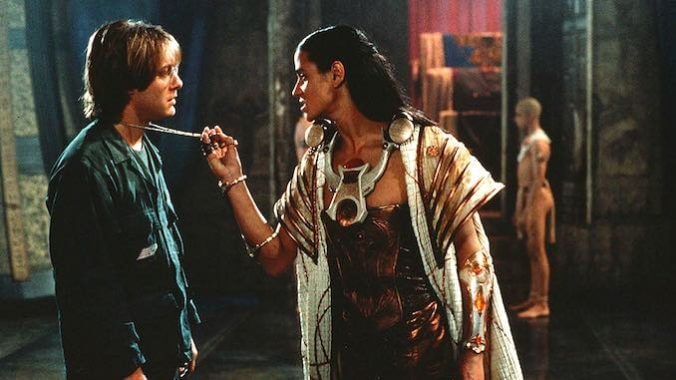
Let’s talk about one of the biggest sci-fi franchises in the world. We’ll give you a hint: it starts with “Star.” No, not that one. Or that one, either.
Sure, Star Trek and Star Wars are arguably the first properties that come to mind. But there’s another “Star” franchise that’s been around for decades and has told as many, or more, stories than those other two combined:
Stargate.
It all started with a lightly-heralded 1994 sci-fi flick about a weird Egyptian artifact that’gla;s really a portal to another planet, and evolved to include multiple television shows (most notably the long-running Stargate SG-1), multiple films, a web series, and even a short-lived streaming service (yes, really)—all built around the simple pitch of modern-day heroes exploring exciting, alien worlds.
But despite running for more than 350 hours of television with SG-1, and spinoffs Stargate Atlantis and Stargate Universe, and those series airing in more than 100 countries and reaching as many as 17 million viewers per week at its peak, Stargate still isn’t spoken in the same breath as the other big “Stars” franchises. So why is that?
We asked Darren Sumner, founder of the popular GateWorld fan site, as he has helped build and grow the fan community around the franchise since 1999. Sumner believes the gap simply comes down to timing.
“I’d attribute much of that to the era when it entered the cultural zeitgeist. There were only three television networks when Star Trek premiered; then it got a series of high-profile feature films. Star Wars was a mega hit from 1977,” Sumner told Paste. “Stargate had a moderately successful film in the 1990s, premiered on a pay cable channel in 1997, and by the time it had mass accessibility (through syndication and Sci-Fi Channel in the U.S.) the entertainment landscape was pretty crowded.”
The other big difference between Stargate and those other sci-fi franchises? Where Trek and Wars are set in the far-flung future, or galaxies far, far away, Stargate is set in the present day, with no lightsabers or starships (well, at least not until later seasons) to make it seem too fantastical.
“The characters are easy to relate to because they are us. Whether it’s Jack’s courage and his subversive humor, Daniel’s moral integrity, Sam’s brilliance, or Teal’c’s deep desire for freedom, every member of the team was in some sense the kind of people all of us aspire to be,” Sumner opined. “These are also shows with big ideas, and writers that respect the audience. I love the franchise because Stargate built a mythology where past events really matter. SG-1 and Atlantis are told in a weekly episodic fashion, but without that dreaded ‘reset button.’ So long-time viewers were continually rewarded by characters, ideas, and plot points coming back around… sometimes years later.”
There’s also the fact that, despite all the success of the recent past, the Stargate franchise has largely been left for dead the past several years. Aside from a web series, the franchise has been dormant for the better part of a decade, while Star Trek is building an entire universe of spinoffs on Paramount+, and Star Wars has taken over Disney+ with original projects, most recently the acclaimed Rogue One-spinoff Andor.
Stargate is owned by MGM, which was recently acquired by Amazon, and fans are hopeful that means the streaming service has some type of plan to bring the franchise back for some long-awaited new adventures. The resilient presence of Sumner’s popular fan site is proof that there are still plenty of fans out there jonesing for fresh content—he just hopes any future revival won’t toss the old continuity out the window.
“Stargate’s fan base has been exceptionally patient in waiting for word of a new production. With the amount of entertainment being produced today, and the number of classic series and franchises being resurrected, it’s actually getting a bit ridiculous that the studio hasn’t pulled the trigger on anything new yet. Or at least signal that they are thinking about it,” Sumner said. “I’m an optimist, so I continue to have high hopes that the Amazon deal will finally break the logjam and get a new series into production. I hope it isn’t a reboot. I like the original film a lot, but I fell in love with this franchise through the characters and the world building of the TV series. So I would like some form of continuation.”
Interestingly enough, original SG-1 co-creator Brad Wright has teased work on a script for a revival of the old series, which would bring back fan favorite characters and tee up a new adventure. Sumner said he hopes that’s a signal for where Amazon might take the franchise, but whatever happens, he hopes the next chapter will at least stay true to what brought fans to the shows in the first place.
“There have been a lot of shows that I’ve loved but never felt all that drawn to go back and rewatch years later. Something about Stargate’s formula makes it highly rewatchable. I think it’s probably the episodic nature combined with its humor and charm,” he said. “Fans can go back and visit an old favorite on the spur of the moment, and not feel like they have to commit to a 200-episode rewatch. In the mood for a comedy? A character drama? An outer-space adventure? A little romance? Want to see a System Lord get taken out? Or a time travel romp? It’s like picking an ice cream flavor—Stargate has it all.”
So for those who are less familiar with the franchise, let’s start with the basics: What is Stargate? Where can you find it? What’s the story’s timeline? Let’s dig in.
![]()
The Movie That Started It All
Stargate (1994)
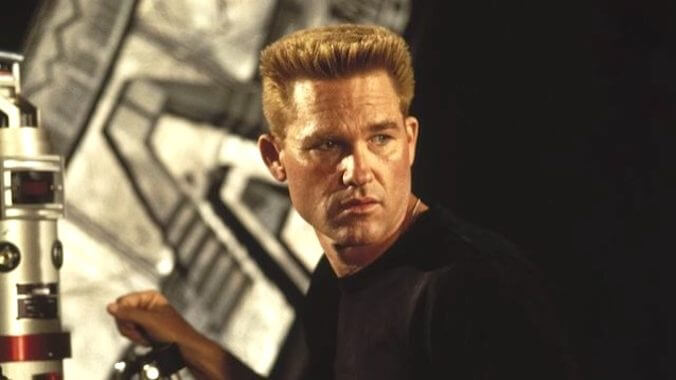
Oh, what humble beginnings. The 1994 Stargate film was created by disaster flick maestros Dean Devlin and Roland Emmerich (who were also behind Independence Day and Godzilla), and proved a modest success at the box office for a fall release, bringing in just shy of $200 million on its total worldwide theatrical run against a budget of $50 million. The film starred Kurt Russell as no-nonsense military man Jack O’Neil, who is paired with a bookish Egyptologist played by a young James Spader.
After Spader’s Dr. Daniel Jackson cracks the code to activate an ancient piece of alien technology, the pair lead a small team through the fantastical device that is actually an interstellar portal to an alien world, which looks a whole lot like Ancient Egypt and is ruled by a wildly egotistical alien (played by Jaye Davidson, coming off an acclaimed debut in 1992’s The Crying Game), who has taken on the identity of the ancient Egyptian sun god Ra.
It’s a mid-budget sci-fi action flick with some unique visuals and twists thanks to the ancient Egypt-style setting, but despite the decent box office performance (and even a tie-in videogame for the SNES and SEGA Genesis, which critics panned), the franchise stopped at one film. Devlin and Emmerich would later reveal they’d hoped to create a trilogy of Stargate films; those never made it off the drawing board, though their rough pitch for the trilogy was loosely adapted into a five-book series of Stargate novels in the late 1990s by author Bill McCay.
![]()
The SG-1 Universe of TV shows
Stargate SG-1 (1997-2007)
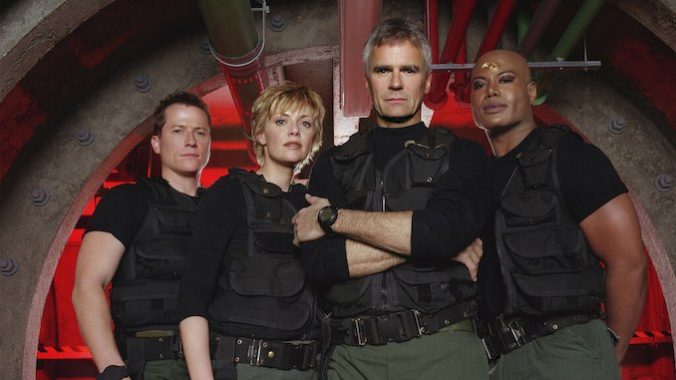
Watch on Netflix (until 11/30)
Instead of film sequels, MGM was more interested in turning the Stargate brand into a television series, so they brought in sci-fi vets Brad Wright and Jonathan Glassner (The Outer Limits) who had a unique pitch for how to take the film and adapt it for television. The twist? The Stargate doesn’t just go to that one planet from the film, but potentially thousands of planets across the universe—making the perfect set-up for an “adventure of the week” sci-fi series.
Richard Dean Anderson (MacGyver) took over the military role originated by Russell, bringing a bit more levity to it (he jokingly spells his Jack O’Neill with two l’s). The cast is rounded out by Micheal Shanks, taking over Spader’s role as Daniel Jackson, and newcomers Amanda Tapping (Samantha Carter) and Christopher Judge (the alien Teal’c), who together make up the core ensemble of SG-1, the flagship team of military explorers who will use the Stargate.
Though the Stargate franchise would eventually be best known as a Sci-Fi Channel original, it started life on the pay cable Showtime network for its first five seasons, becoming a solid hit and gaining more fans year-to-year in syndication.
Showtime decided to pull the plug on the series after five seasons, which is when the Sci-Fi Channel stepped in to save it (reruns of the early seasons had already proven a solid hit for the network). Sci-Fi eventually renewed it for another five years, bringing the total run to 10 seasons. The cast would shake up a bit along the way in the later years, with Farscape alumni Ben Browder and Claudia Black eventually joining the series, and Anderson’s role reduced to “recurring” in those final seasons.
Through it all, SG-1 stayed largely true to its original pitch, with the team spending most episodes exploring new worlds, revisiting old ones to see what fresh chaos has emerged, and facing off with super-powered aliens. (They’d eventually cycle through a few different evil alien races along the way, though they all seemed to stick to the “false god” concept pioneered in the original 1994 film).
After the series wrapped, the creators would go on to produce two direct-to-DVD to continue the story with a couple more adventures.
Stargate Atlantis (2004-2009)
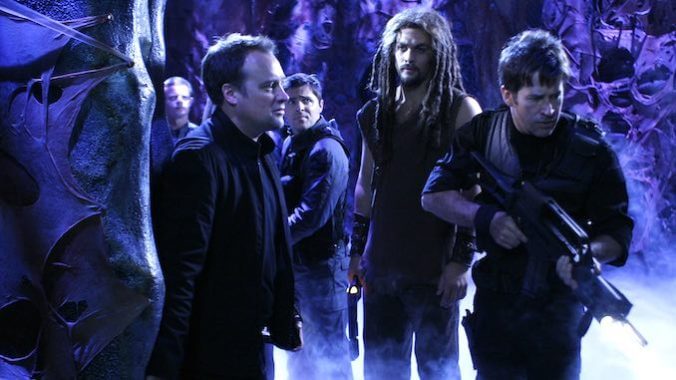
With SG-1 proving such a hit, the Sci-Fi Channel launched a spinoff series late in the flagship series’ run, with the goal of using Atlantis as a replacement. The only problem was that SG-1 was still doing too well to actually cancel, so both shows ran simultaneously for those first three seasons. Where SG-1 was Earth-based, Atlantis took the action to another galaxy altogether, with a new team of explorers (and a few familiar faces who’d had supporting roles during SG-1) setting up shop in the legendary lost city of Atlantis (yes, in Stargate continuity the city was a legendary alien civilization lost to history).
This new team also faces a new enemy, hanging up the false gods schtick for a scarier race of aliens called the Wraith, who are vampire-esque and literally drain the life from their enemies. The show also proved a solid hit for the network, tapping into a lot of the same vibes as SG-1 while offering up a mysterious alien city as the new stomping ground to be explored. The show would host several crossovers with SG-1 along the way, with former SG-1 star Amanda Tapping joining the show as a series regular for one season after SG-1 ended.
Atlantis ended after five seasons, with plans to produce a handful of direct-to-DVD movies to wrap up the story. But sadly, the market for direct-to-DVD films dried up quickly with the rise of streaming, and MGM never moved forward with the projects.
Stargate Universe (2009-2011)
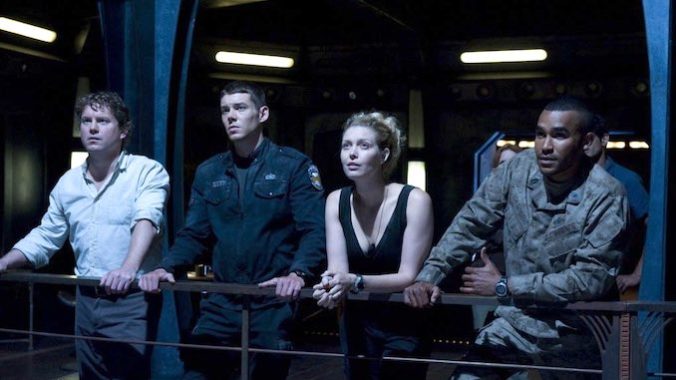
With its third live-action series, the Stargate franchise took things in a decidedly different direction, tapping into some of the gritty, handheld visuals made famous by another Sci-Fi Channel original series in recent years: Battlestar Galactica. Unlike the previous two shows, Universe was set-up with the pitch of “the wrong people in the wrong place.” It follows a group of evacuees who wind up landing on an ancient, far-flung alien starship with no supplies, little expertise, and pretty much no clue of where they are or how to get home. Oh, and the ship itself is millions of years old and falling apart—with the crew having to scramble for everything from water to oxygen in the show’s opening season.
The show received a mixed reception from Stargate fans more accustomed to the franchise’s more optimistic tone, though in the last decade it’s become a bit more beloved with the benefit of nostalgia. It took on darker themes and was easily the most risqué entry in the franchise, following very much in the tonal footsteps for BSG. But unlike the previous Stargate shows, Universe was canceled due to flagging ratings after just two seasons and ended on a cliffhanger—with the fate of the lost crew never truly resolved
![]()
The (Other) Movies
Stargate: The Ark of Truth (2008)
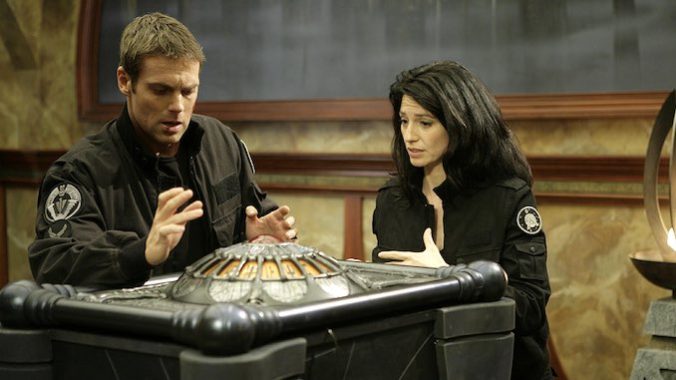
Though the series finale of SG-1’s television run provided a nice endpoint for the story and characters, MGM was keen to keep the franchise going through direct-to-DVD film releases. The first was The Ark of Truth, which provided some long-awaited closure to the show’s ongoing narrative of the final few seasons with new villainous aliens the Ori. It’s a big, grand adventure with the fate of the galaxy at stake (classic Stargate stuff), as the team takes on this epic threat once and for all. As is usually the case with SG-1 stories, the good guys triumph in the end, and fans are treated to what is effectively a super-sized finale to wrap up the story and leave the door open for plenty more adventures to come.
Stargate: Continuum (2008)
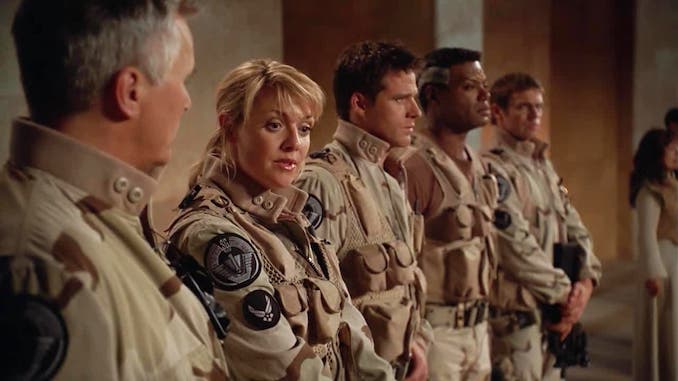
The second direct-to-DVD film in the SG-1 canon serves as a template for the types of one-off adventures the creators clearly wanted to experiment with when it came to the direct-to-DVD film medium. The franchise was no stranger to time travel stories (what’s a good sci-fi series without some time travel adventures, after all?), and Continuum easily proved to be one of the franchise’s best stories to date. An old villain sets off a time travel plot to prevent Earth from ever discovering the Stargate at all, which would effectively erase the continuity of the franchise itself. The team makes it through the gate only to emerge in a reality where the Stargate remained lost for decades.
The team then remains stuck in this alternate reality for more than a year, as we get to explore this different timeline and the impact it has on the SG-1 team unable to set it right. But as luck would have it, that pesky alien armada comes calling, and the old team is thrust back into action to find their way back, reset the timeline, and restore the reality fans know and love. The film is loaded with callbacks to the SG-1 series and an excellent time travel story in its own right.
Since the film proved to be the final entry in the SG-1 TV and film canon, it’s also an excellent stopping point.
![]()
The (Random) TV Shows and Failed Streaming Service
Stargate Infinity (2002-2003)
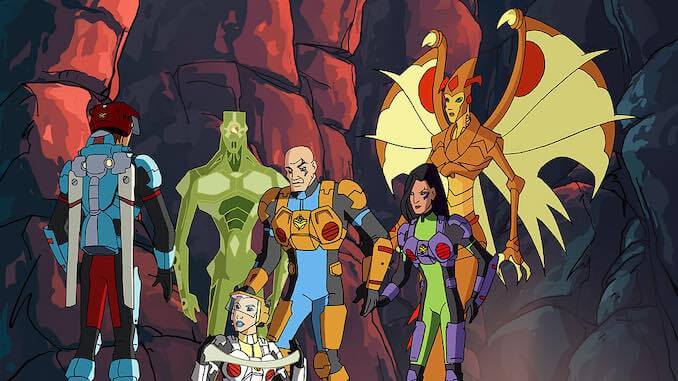
Here’s where it starts to get a little weird. This little-watched, future-set animated series is largely ignored by fans (and pretty much the world at large), but follows a future Stargate team member who is framed for a crime he didn’t commit and escapes through the ‘gate with a team of young recruits out to clear their names. The show ran for 26 episodes, and critics panned pretty much every aspect of it, from the cheapish animation to the meandering, largely boring, and convoluted story.
The creators behind the mainline shows and films had nothing to do with the series, and made clear it wasn’t within their continuity. Which makes sense, as a key piece of the Stargate formula is that it is set in the modern day, which made Infinity’s future setting all the more confusing and disorienting. Even worse, for anyone who actually liked Infinity, the show was canceled so quickly that pretty much all of its lingering storylines remained unresolved.
Stargate Origins (2018)

For a brief moment before MGM was gobbled up by Amazon, the studio tried to launch its own niche streaming service to serve up all the Stargate that fans could want. Dubbed Stargate Command, the service hosted all the TV shows, films, featurettes, and interviews around the franchise in one place for fans. Not surprisingly, this niche service proved largely too niche to succeed, and was axed after less than two years.
But before it went to the ol’ alien streaming graveyard in the sky, the upstart service gave fans one original Stargate story in the form of a low-budget, short-form web series dubbed Stargate Origins. The biggest surprise of all? It’s honestly not bad. The web series (which was eventually edited into a feature length film cut titled Stargate Origins: Catherine) is a prequel to the original film, set in the late 1930s—not long after the Stargate is first uncovered in Egypt. The story follows an untold adventure through the gate for a young Egyptologist named Catherine Langford (we meet the character as an old woman in the original Stargate film) who gets wrapped up in a Nazi plot to use the Stargate.
The story is low stakes but fun, and as fans will surely note, painstakingly jumps through hoops to tell a new story while making sure it doesn’t break any future canon from the original film and SG-1 era. It was an interesting prototype for the types of stories that could still be told in the franchise outside the obvious, but sadly goes down in the history books as little more than a stopgap distraction while fans wait to see what’s next for the franchise.
![]()
So What’s Next for Stargate?
That’s the question fans have been asking ever since Stargate Universe ended back in 2011. Fresh off Amazon’s acquisition of MGM, it would stand to reason the franchise could have a new lease on life once Amazon has a chance to start digging into the MGM vault. Prime Video’s originals (and continuations) feature plenty of sci-fi, from Night Sky andThe Expanse to Man in the High Castle, Tales from the Loop, and The Peripheral. And, they’ve started focusing on adaptations and expansion in the fantasy realm with Wheel of Time and Rings of Power. So one would think there might be space in the catalog for a new sci-fi adventure series with a built-in audience at some point.
For what it’s worth, Wright has been vocal about developing a script for a revival of the SG-1 world, but there’s never been any indication the project would actually move forward (especially in the wake of the Amazon deal). So for now, fans are still left wondering what’s next, and whether or not any future series or film will stick to that old continuity or wipe it clean for a fresh slate.
Whatever happens, here’s hoping the next chapter can finally garner Stargate some much-needed “Star”-powered respect.
Trent Moore is a recovering print journalist, and freelance editor and writer with bylines at lots of places. He likes to find the sweet spot where pop culture crosses over with everything else. Follow him at @trentlmoore on Twitter.
For all the latest TV news, reviews, lists and features, follow @Paste_TV.